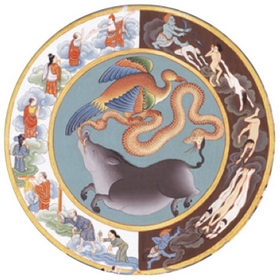If you are having trouble viewing this e-mail, click here for web version.
 |
Vrtti May 2018 - Yoga and a More Relevant Online Experience |
 |
|
Dear Yoga Friends, It's been about five years since I last wrote something about Mark Zuckerberg (see Yoga and What Really Matters, October 2013). Time to circle back to him. Like many others, I listened with fascination to his congressional testimony a month ago. The themes of privacy, technology, and what is in humanity's best interest are so important. What stood out for me is Mark's vision of building something that connects the world, is free and available to all, and is paid for by selling access to personal information to advertisers who want to target ads more accurately. Mark described the result positively as "making people's online experience more relevant", where "relevant" presumably means presenting you regularly with ads for things you want or information you might be interested in. The yoga sutras as well as the Buddhist world view have something to say about this: to be truly happy, or if we want to go further, enlightened, a cycle of desire, greed, anger, and ignorance must be broken. Mark's model keeps people addictively engaged with a flywheel of desire-fueled compulsive behavior. This also plays into a culture of distorted information which has gotten us into a really fine mess, as well as a culture of consumption which has resulted in the great Pacific Ocean garbage patch, about the size of Alaska and consisting mostly of plastic. The key concept here is ignorance, or avidya, a state of consciousness in which personal evolution becomes obscured by the senses and desire. Avidya is one of five afflictions that get in the way of our spiritual progress, and is so important that Patanjali wrote two sutras about it (translations from B.K.S. Iyengar's Light on the Yoga Sutras of Patanjali):
Most of the sutras puzzle me with their subtlety, but these two are surprisingly clear. For example, a month ago I found a hole in some long underwear that I like and promptly searched on the internet to see if they could be replaced. Looking at the prices, I chose to live with the hole for a while. But now I'm continually pelted with ads for men's long underwear. This must be the relevant online experience Mark is referring to, and is also a great example of mistaking the transient (my feeling of incompleteness of having a hole in my underwear) for the relatively permanent (my deeper understanding that things are ok as is). Clearly the most relevant online experience would be a moderated one that retains the fun part of sharing stories, photos, and videos, but allows much more time for the search for true knowledge and in-person time with people we love. So when congress calls me to Washington to give the yoga perspective on all this, watch out everyone, I will recite these sutras. I just hope that I can hold up under the pressure as well as Mark did. Namaste, Chad |
|
|

